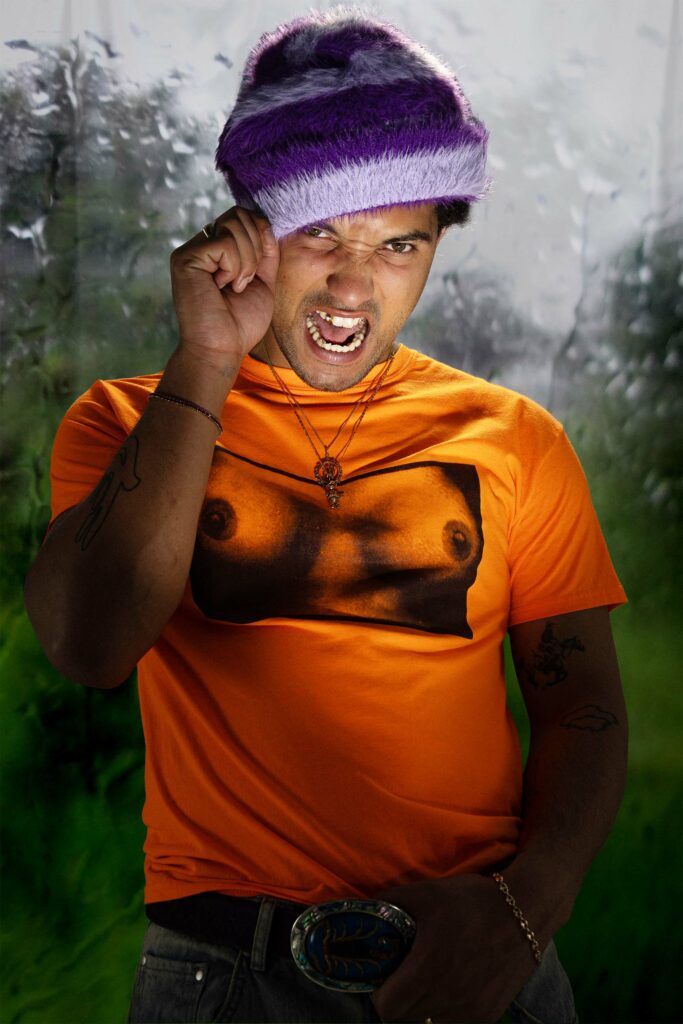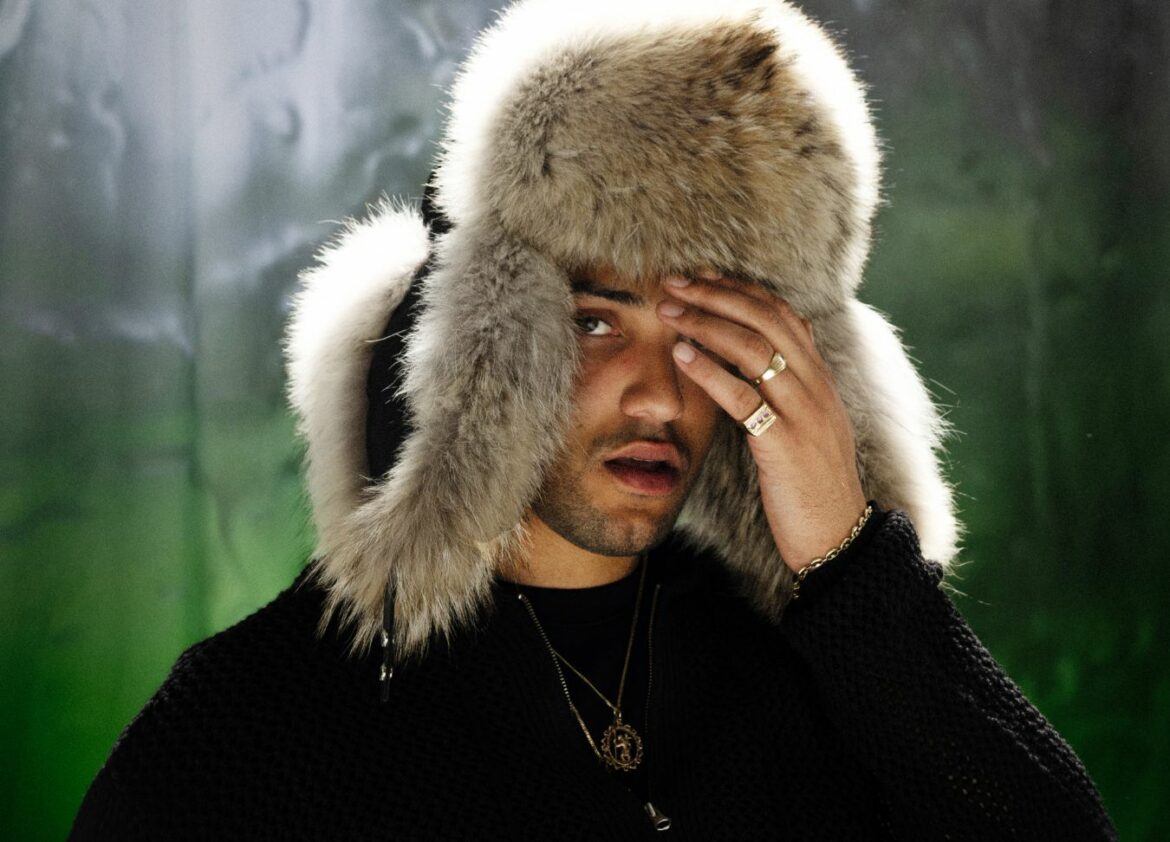Brit-Newcomer Jeshi spricht über die Entstehung seines neuen Albums „Airbag Woke Me Up” und wie es seinen Weg von Herausforderungen hin zu persönlicher Weiterentwicklung widerspiegelt.
Jeshi ist ein Name, den sich Musikfans merken sollten. Der 29-jährige Londoner Rapper sorgte 2022 mit seinem Debütalbum „Universal Credit” für Aufsehen und setzt nun mit seinem neuen Album „Airbag Woke Me Up”, das am 24. Januar erschienen ist, noch einen drauf. Vom Londoner Leben geprägt, kombiniert Jeshi tiefgründige Texte mit einem energiegeladenen Sound, der Einflüsse aus Hip-Hop, elektronischer Musik und Punk vereint.
„Airbag Woke Me Up” markiert eine deutliche stilistische Abkehr von Jeshis Debütalbum. Die neue Platte strotzt vor Energie, Charisma und einer unerwarteten Punk-Attitüde, die Rap herausfordert. „Ich wollte, dass sich das Album wie eine Erweckung anfühlt. Ein klangliches Erwachen“, erklärt er. Ganz im Sinne seiner Vision, Musik mit Bedeutung zu erschaffen, geht es in diesem Album nicht nur ums Aufwachen, sondern auch ums Neudenken. „Airbag Woke Me Up” ist für Jeshi eine Brücke zwischen Schmerz und Triumph, Sound und Emotion, Künstler und Publikum. Während er sich auf die bevorstehende Europa-Tour vorbereitet, steht eines fest: Jeshis Musik wird schon jetzt nicht nur gehört, sie wird gefühlt.
In unserem exklusiven Interview öffnet sich Jeshi über die prägenden Krisen, die sein neues Album inspirierten und seine wachsende Zuversicht im Leben.

BLONDE: Der Albumtitel deutet auf eine Art Erwachen und Neuausrichtung hin. Inwiefern spiegelt er deine persönlichen Erfahrungen und die zentrale Botschaft des Albums wider?
Jeshi: Der Name entstand aus einem Gespräch mit einem Freund über einen Autounfall, den ich als Jugendlicher hatte. Er blieb hängen – nicht nur, weil er cool klingt, sondern weil er auch symbolisiert, wie schwierige oder unerwartete Situationen das Potenzial haben, uns zu verändern. Ich wollte, dass dieses Album aufgeladen wirkt, wie ein musikalischer Weckruf.
Hat das Feedback auf „Universal Credit” deine Herangehensweise an dieses Album beeinflusst?
Definitiv. Ich wollte etwas Neues machen, das nicht ganz so düster klingt. Ich will nicht auf das Image festgelegt werden, nur traurige Geschichten zu erzählen. Gleichzeitig war es mir wichtig, authentisch zu bleiben und Geschichten zu erzählen, mit denen sich Menschen identifizieren können, ohne dabei zu sehr ins Negative abzudriften.
Was sollen Hörer*innen aus dem Album mitnehmen?
Ich hoffe, sie erkennen, dass Rap nicht auf einen bestimmten Sound festgelegt werden muss. Für mich geht es darum, das Genre weiterzuentwickeln und neue Ideen sowie Klänge einzubringen.
Gleichzeitig wünsche ich mir, dass sie das Album im Kontext meines ersten Werks sehen. Das Leben ist nie nur schwarz oder weiß. Es besteht aus Höhen und Tiefen. Ich möchte sowohl Schmerz als auch Triumph zeigen, denn nur eine Seite der Realität abzubilden, wäre weder authentisch noch menschlich.

Deine Wurzeln in Ost-London kommen in deinen Werken oft zum Vorschein. Wie beeinflusst dich die Stadt?
London ist generell eine Inspiration für mich. Es ist ein kleiner Ort, aber es gibt hier so viel großartige Kunst, Musik und Kultur. Gleichzeitig ist es eine harte Stadt, in der man sich durchkämpfen muss. Diese Londoner Frustration ist meine größte Inspiration.
Wie überträgst du dein Storytelling in Sound?
Es beginnt mit einer Idee in meinem Kopf von der Welt, in die ich meine Musik verpacken will. Für dieses Album wollte ich eine raue, stellenweise sogar unangenehme Atmosphäre schaffen. Diese Vision leitete dann meine Produktionsentscheidungen. Beim Songwriting spiegeln sich dann mein Leben und meine Gedanken im Moment wider.
Live zu spielen ist der Moment, in dem ich wirklich mit den Fans connecten kann.
Hast du eine bestimmte Schreibroutine oder einen Ort, der dich besonders inspiriert?
Ich fand die Idee, mit der Hand zu schreiben, schon immer romantisch. Aber das Problem ist, dass ich meine eigene Handschrift später nicht mehr entziffern kann. Deshalb schreibe ich meistens auf meinem Handy. Ich kann überall schreiben. Am liebsten in einem Raum voller Menschen, mit Gesprächen und Gelächter im Hintergrund. Diese Energie hilft mir, im Flow zu bleiben, während ich herumlaufe und meine Ideen sammle.
Deine visuellen Konzepte sind wirklich eindrucksvoll. Wie gehst du daran, deine Musik in eine bildhafte Erzählung zu übersetzen?
Visuelle Elemente sind ein zentraler Bestandteil meiner Arbeit. Schon als Kind war ich von Musikvideos besessen. Deshalb stecke ich jetzt umso mehr Energie in deren Umsetzung. Es ist immer ein kollaborativer Prozess. Ich recherchiere Regisseur*innen, die spannende Dinge machen, und tausche mich mit ihnen aus. Am Ende geht es darum, den richtigen Leuten zu vertrauen und ihnen Raum für ihre eigene Kreativität zu geben.
Wie wählst du deine Kollaborationspartner*innen aus und was macht eine Zusammenarbeit erfolgreich?
Meistens entstehen Kollaborationen ganz organisch. Man bewegt sich in denselben Kreisen, lernt sich kennen, und irgendwann ergibt sich eine Zusammenarbeit. Manchmal bringt ein Label Leute zusammen, das fühlt sich dann fast wie ein Blind Date an. Und man weiss nicht, ob die Chemie stimmen wird.
Du gehst bald auf Europatour. Was können deine Fans von deinen Live-Shows erwarten?
Das ist meine erste richtige Tour mit einem voll durchgeplanten Live-Set. Wir haben das Ganze auf ein neues Level gehoben, damit es genauso immersiv wird wie das Album. Live zu spielen ist der Moment, in dem ich wirklich mit den Fans connecten kann. Streams und Zahlen können so abstrakt wirken, aber auf der Bühne kann ich den Menschen direkt etwas zurückgeben.
Gibt es etwas, worauf du dich bei der Tour besonders freust, abseits der Konzerte?
Leider ist der Zeitplan meist so eng, dass ich kaum Gelegenheit habe, die Städte zu erkunden. Aber ich will unbedingt ein paar lokale Spezialitäten probieren, wie Currywurst!

English version below:
Jeshi is a name every music fan should remember. The 29-year-old London rapper made waves in 2022 with his debut album “Universal Credit” and is now taking things to the next level with his new album “Airbag Woke Me Up”, which was released on January 24. Inspired by London’s pulse, the rapper blends introspective lyrics with a high-energy sound that seamlessly fuses influences from hip-hop, electronic music, and punk.
“Airbag Woke Me Up” marks a significant stylistic shift from Jeshi’s debut. The new record bursts with energy, charisma, and an unexpected punk attitude that challenges rap conventions. “I wanted the album to feel like an awakening. A sonic awakening,” he explains. True to his vision of creating music with meaning, this album isn’t just about awakening—it’s about shifting perspectives. “Airbag Woke Me Up” serves as a bridge between pain and triumph, sound and emotion, artist and audience. As he gears up for his upcoming European tour, one thing is clear: his music isn’t just heard; it’s felt.
In our exclusive interview, Jeshi opens up about the defining struggles that inspired his new album and his growing optimism.
BLONDE: The title “Airbag Woke Me Up” hints at themes of awakening and redirection. How does it reflect your personal experiences and the central message of the album?
Jeshi: The name came from a conversation with a friend about a car crash I had when i was younger. It [the title] stuck, not just because it sounded cool, but because it symbolises how unfortunate circumstances in life can spark transformation. I wanted this album to feel charged, like a sonic awakening.
Coming off the success of your debut album “Universal Credit,” did the album’s reception change how you approached this one?
Yeah, I wanted to create something new that didn’t feel so dismal. I didn’t want to be pigeonholed as someone who only tells bleak stories. At the same time, it was important for me to stay authentic and tell stories people could relate to without leaning too heavily into the doom and gloom.
What do you hope listeners take away from your new album?
I hope they realise there isn’t just one single sound for rap. For me, it’s about pushing the genre forward and introducing new ideas and sounds.
I also want them to see this album in the context of my first one. Life isn’t one-sided. There’s pain, but there’s also triumph. It wouldn’t be authentic to only show one perspective.
Your East London roots often surface in your work. How does the city influence you?
London generally is a huge inspiration. It’s such a tiny place, but breeds so much great art, music, and culture. At the same time, it’s a tough city to live in. That London frustration is my main inspiration.
How do you translate your storytelling into sound?
It starts with an idea in my head of the world I want my music to exist in. For this album, I wanted it to feel abrasive, even uncomfortable at times. That vision guided my production decisions. In terms of songwriting, the lyrics are always a natural reflection of my life and thoughts at the moment.
Do you have a specific writing routine or a place that particularly inspires you?
I always romanticise writing by hand, but the problem is I can never read my handwriting afterward. So, I mostly write on my phone. I can write anywhere. Though I prefer being in a room full of people, with conversations and laughter in the background. That energy keeps me in the flow while I pace around and jot down ideas.
Your visuals are always striking. How do you approach translating your music into a visual narrative?
Visuals are super important to me. I grew up obsessed with music videos. So, now when I have the opportunity to create them, I pour a lot of energy into getting them right. It’s always a collaborative process. I research directors who are doing exciting things, then we exchange ideas. In the end, it’s about trusting the people you work with and letting them bring their own creativity to the table.
How do you choose your collaborators, and what makes those partnerships work?
Most collaborations happen quite organically. You move in the same circles, get to know each other, and eventually, something comes together. Sometimes a label sets things up, and that feels a bit like a blind date. You never know if the chemistry will be right beforehand.
You’re gearing up for your European tour. What can fans expect from your live shows?
This is my first proper tour with a fully developed live set. We’ve elevated things to make the experience as immersive as my music. Performing live is when I really get to connect with the fans. Streams and numbers can feel abstract, but on stage, I can give back to the people who give so much to me.
Is there anything you’re looking forward to most on tour aside from the shows?
Unfortunately, the schedule is usually so packed that I barely have time to explore the different cities. However, I do want to try some local dishes, like currywurst!
Was euch sonst noch interessieren könnte:
Über Queer-Sein, Verletzlichkeit und ihr neues Album „Matriarchy”: Musikerin Girli im Interview
Kraft der Sterne: Wie die Wassermann-Saison eure Träume beflügelt
Urban Siren: Mit mytischem Charme durch die Straßen von Barcelona





